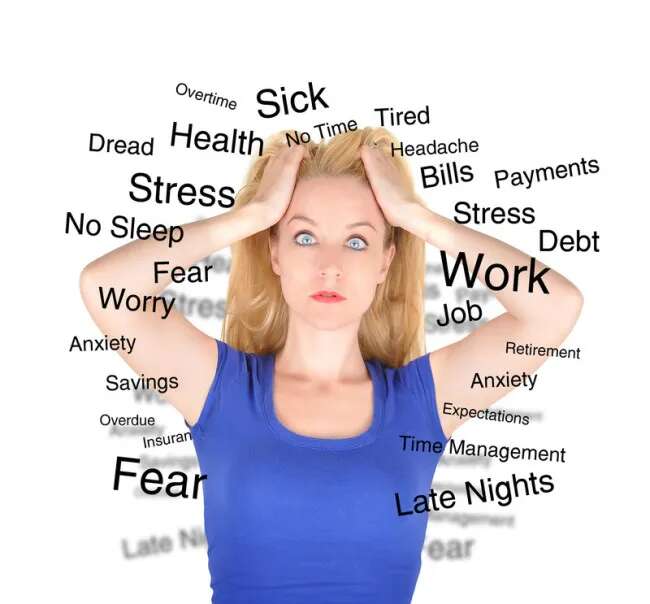Coping With Anxiety Disorder
12 Signs You Might Have An Anxiety Disorder

What Actually Cause the Anxiety Disorder
There may be many causes of anxiety disorder.
We may not be just physically locked down. We are locked-down in our territories of mental, spiritual, emotional, social and economic.
Locking us down deep inside our own thoughts, fears, apprehensions and dilemmas. Is this end of the world? Is it too soon? My kids are too young to die? What will happen If I become corona positive who will take care of my kids?
There are many explanations why you could be worried: for example, a big demonstration at work or a family health concerns. But anxiety could be nagging up on you in startling ways.
What is not normal?
To face unpredictable situation at work or at home or in life general requires lot of relaxing state of mind.
It is in our hands to stay calm in testing times or to blow away with panic attacks.
To get rid of anxiety first rule is to help relax yourself all the time and anywhere.
Excessive worry
Another sign of anxiety disorder would be extreme levels of worry about almost everything.
It could be from cooking food to dealing with hyperactive child, or to handle a bossy spouse, or worried about health, money or parents.
If you are getting worried about every thing then it could be the possibility of having an anxiety disorder perpetuating inside you.
Sleepless nights and sleep problems
You’ve heard it before and you’ll hear it another time: grown-ups need to sleep usual of seven to nine hours per night. Why? getting enough sleep is healthy for many reasons—some of which may surprise you.
Irrational and illogical fears
Some anxiety isn’t sweeping at all; on the contrary, it’s attached to a precise situation or thing—like flying, animals, or crowds.
If the fear becomes irresistible, unruly, and way out of proportion to the actual risk involved, it’s a typical sign of phobia, a kind of anxiety disorder.
Although ‘phobias can be crippling’, they’re not noticeable at all times.
In fact, they may not surface until you confront a precise situation and realize you’re powerless in overcoming your fear.
“A person who’s afraid of snakes can go for years without having a problem,” Winston says. “But then suddenly their kid wants to go camping, and they realize they need treatment.”
Muscular stiffness
Consistent muscles stiffness— whether it involves of clenching your jaw, balling your fists, or bending muscles throughout your body—often escorts anxiety disorders.
This sign can be so obstinate and pervasive that people who have lived with it for a long time may stop perceiving it after a while.
What can help?
Regular exercise can help keep muscle tightness under control, but the tension may exaggerate if an injury or other unexpected event interrupts a person’s workout habits.
Winston says, “Suddenly they’re a wreck, because they can’t handle their anxiety in that way and now, they’re incredibly restless and irritable.”
Chronic indigestion
If you get constipated you know all too well just how painful it can be.
Fortunately, you have a few possibilities that will help to get things moving. That is to keep mild exercise routine with lot of intake of fibers.
Stage Fright
Stage fright is another kind of anxiety indicator.
Most people get at least a few butterflies before speaking a group of people or otherwise being in the limelight.
But if the terror is so strong that no volume of training or rehearsal will assuage it, or if you spend a lot of time thinking and worrying about it, you may have another kind of social anxiety disorder.
Self-consciousness

Social anxiety disorder doesn’t always encompass addressing to a crowd or being the center of attention.
In many scenarios, the anxiety is triggered by everyday situations, such as making one-on-one conversation at a party, or eating and drinking in front of even a small number of people.
This kind of anxiety is faced by preschooler kids and toddlers also. They tend to get very upset when they have to eat in front of guests.
In these conditions, people and kids with social anxiety disorder have a tendency to feel self-conscious, as if all eyes are on them, and they often experience blushing, trembling, nausea, generous sweating, or trouble talking.
These symptoms can be so unsettling that they make it tough to meet new people, sustain relationships, and advance at work or in school.
Panic disorder
According to Winston, ‘Panic attacks can be terrifying: Picture a sudden, gripping feeling of fear and helplessness that can last for several minutes, accompanied by scary physical symptoms such as breathing problems, a pounding or racing heart, tingling or numb hands, sweating, weakness or dizziness, chest pain, stomach pain, and feeling hot or cold’.
Many people have some point in their lives have experienced panic or panic attack like symptoms.
With therapies and medications people feel a lot better and find ways to control their panic.
Flashbacks—reliving past
Similarly, according to Winston, ‘reliving a disturbing or traumatic event—a violent encounter, the sudden death of a loved one—is a hallmark symptom of post-traumatic stress disorder (PTSD)’.
It stocks some features with anxiety disorders.
According to latest research on anxiety disorders PTSD has also been classified at an anxiety disorder rather than a stand-alone mental disorder.
Problem of perfectionism
The fanatical mindset known as perfectionism “goes hand-in-hand with anxiety disorders,” Winston says. “If you are constantly judging yourself or you have a lot of anticipatory anxiety about making mistakes or falling short of your standards, then you probably have an anxiety disorder.”
In order to be analyzed with obsessive-compulsive disorder, a person’s obsessiveness and disturbing thoughts must be escorted by obsessive behavior, whether it’s mental (telling yourself It’ll be all right over and over again) or physical (hand-washing, straightening items).
Being in continuous state of self-doubt is a common feature of anxiety disorders, including generalized anxiety disorder and OCD.
In some cases, the doubt may turn around a question that’s central to a person’s identity also.
You can also read more about anxiety disorder here

About The Author
Rabia Shaukat
Rabia Shaukat is a person of many talents. Mostly she loves to write on various and diverse topics on life. Born, brought up and schooled in Lahore, now she currently resides in the United States of America (USA) with family.